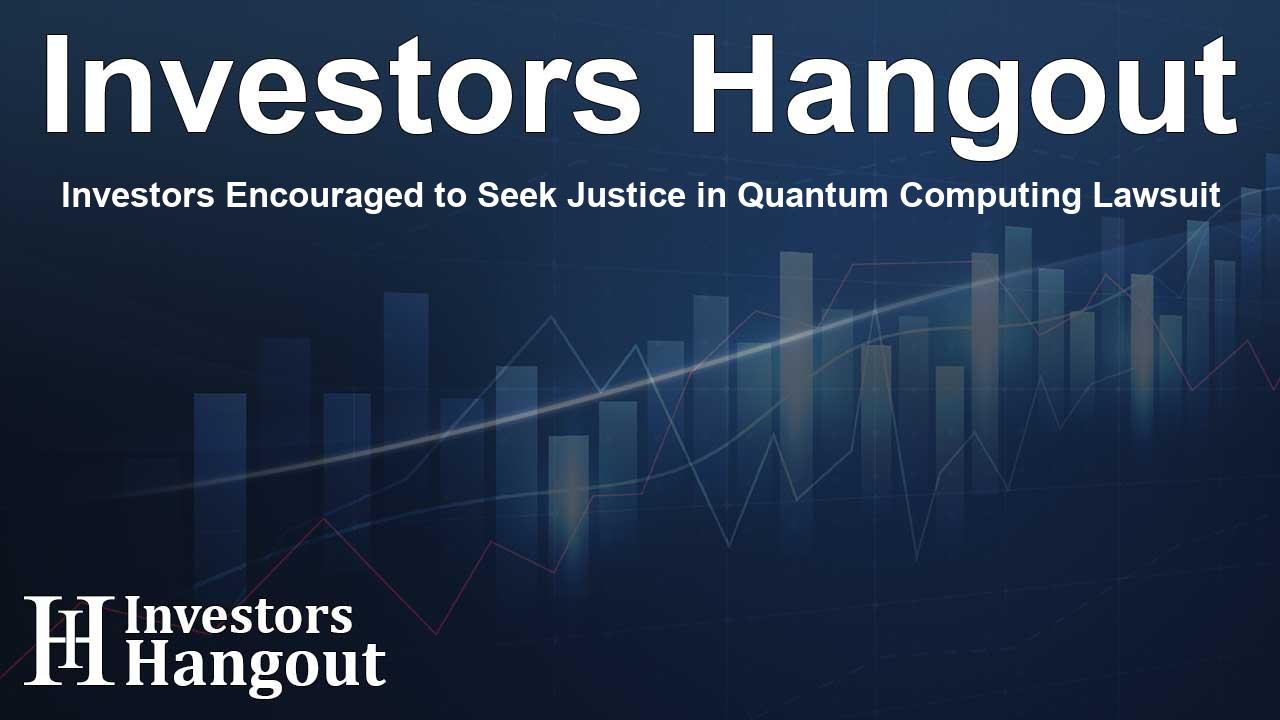Investors Encouraged to Seek Justice in Quantum Computing Lawsuit

Introduction to Quantum Computing Inc.'s Securities Litigation
In recent developments within the financial sector, investors in Quantum Computing Inc. (NASDAQ: QUBT) with losses exceeding $100,000 have been given an important opportunity. The legal landscape has become increasingly significant for those who acquired securities from the company between certain time frames, as a class action lawsuit is now in motion.
Understanding the Class Period and Your Rights
For those who purchased Quantum Computing's stock between specific dates, the Rosen Law Firm has issued a reminder about the upcoming class action lead plaintiff deadline. Investors are encouraged to understand their rights in the face of potentially misleading statements made by the company's management during this critical period. This is a chance for affected investors to reclaim a fraction of their losses through legal avenues without incurring upfront costs.
What Qualifies for Participation?
Individuals who acquired Quantum Computing securities within the defined class period may find themselves eligible for compensation. The claim indicates that the lead plaintiff must act as a representative for fellow investors, guiding the case through litigation proceedings. This arrangement aims to provide a collective voice for those impacted by the company's previously undisclosed risks.
Why Choose the Rosen Law Firm?
The Rosen Law Firm stands out as a dedicated advocate for investor rights, demonstrating a proven track record of successful class action litigations. Their achievements include notable settlements and recognition within the legal community, emphasizing the importance of selecting counsel with significant experience and results in similar cases.
Allegations in the Lawsuit: What You Should Know
The lawsuit against Quantum Computing Inc. points to a range of allegations regarding inadequate disclosures and inflated claims about the company's technologies and partnerships. A primary concern revolves around misleading representations related to their advancements in quantum computing technology, relationships with prominent clients like NASA, and the real progress concerning their products. These claims draw attention to the negative implications such disclosures could have on the firm’s reputation and financial stability.
Impact on Investors
When the truth emerged about Quantum Computing's actual operational viability and business dealings, it prompted significant investor dissatisfaction. This shift in perception led to a marked decline in stock value, resulting in financial losses for many shareholders. Understanding these developments can empower investors when considering their next steps in pursuing recovery through the ongoing litigation.
How to Proceed
Investors contemplating joining the Quantum Computing class action are encouraged to act swiftly. While staying informed is essential, having expert legal guidance will be invaluable in navigating these complexities. The Rosen Law Firm emphasizes that participating in this legal effort does not require immediate financial investment from the investors themselves, as representations can be made under a contingency fee basis.
Class Action Participation and Next Steps
As the class action unfolds, potential participants must understand that no class has currently been certified. Until that point, individual representation remains an option for those interested. Interested parties can select counsel of their preference or remain passive members of the class until further developments. An investor's chance to benefit from any future settlement will not hinge solely on being a lead plaintiff, allowing for a broader range of participation.
Contact Information for Legal Guidance
For additional inquiries regarding the Quantum Computing class action, interested individuals can reach out to legal representatives such as Phillip Kim, Esq. Contact details are readily available for consultation regarding participation and representation intricacies.
Frequently Asked Questions
What is the class action about?
The class action pertains to alleged securities fraud involving misleading statements by Quantum Computing Inc. that impacted investor decisions during the class period.
Who is eligible to join the class action?
Investors who bought Quantum Computing securities during the class period and suffered financial losses are eligible to join the class action.
What should I do if I want to join?
Those interested in participating should contact the Rosen Law Firm or a similar counsel to discuss their situation and understand their options.
Will I have to pay any fees upfront?
No, joining the class action typically involves no upfront fees, as law firms often work on a contingency fee basis.
What happens if the class action is successful?
If successful, the class action could lead to financial compensation for participating plaintiffs, helping to recover some of their losses.
About The Author
Contact Evelyn Baker privately here. Or send an email with ATTN: Evelyn Baker as the subject to contact@investorshangout.com.
About Investors Hangout
Investors Hangout is a leading online stock forum for financial discussion and learning, offering a wide range of free tools and resources. It draws in traders of all levels, who exchange market knowledge, investigate trading tactics, and keep an eye on industry developments in real time. Featuring financial articles, stock message boards, quotes, charts, company profiles, and live news updates. Through cooperative learning and a wealth of informational resources, it helps users from novices creating their first portfolios to experts honing their techniques. Join Investors Hangout today: https://investorshangout.com/
The content of this article is based on factual, publicly available information and does not represent legal, financial, or investment advice. Investors Hangout does not offer financial advice, and the author is not a licensed financial advisor. Consult a qualified advisor before making any financial or investment decisions based on this article. This article should not be considered advice to purchase, sell, or hold any securities or other investments. If any of the material provided here is inaccurate, please contact us for corrections.
